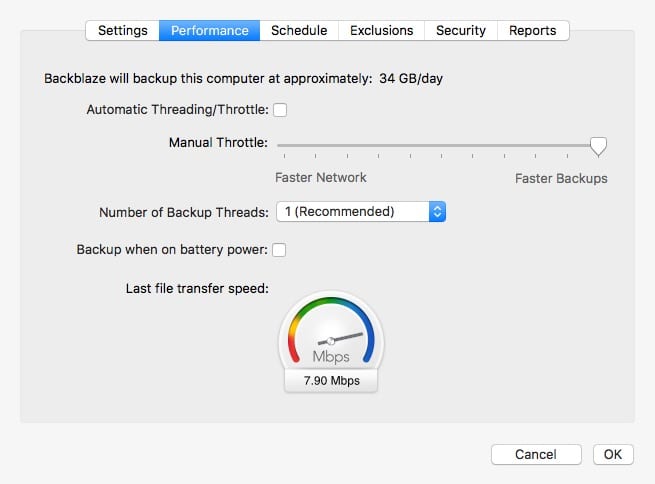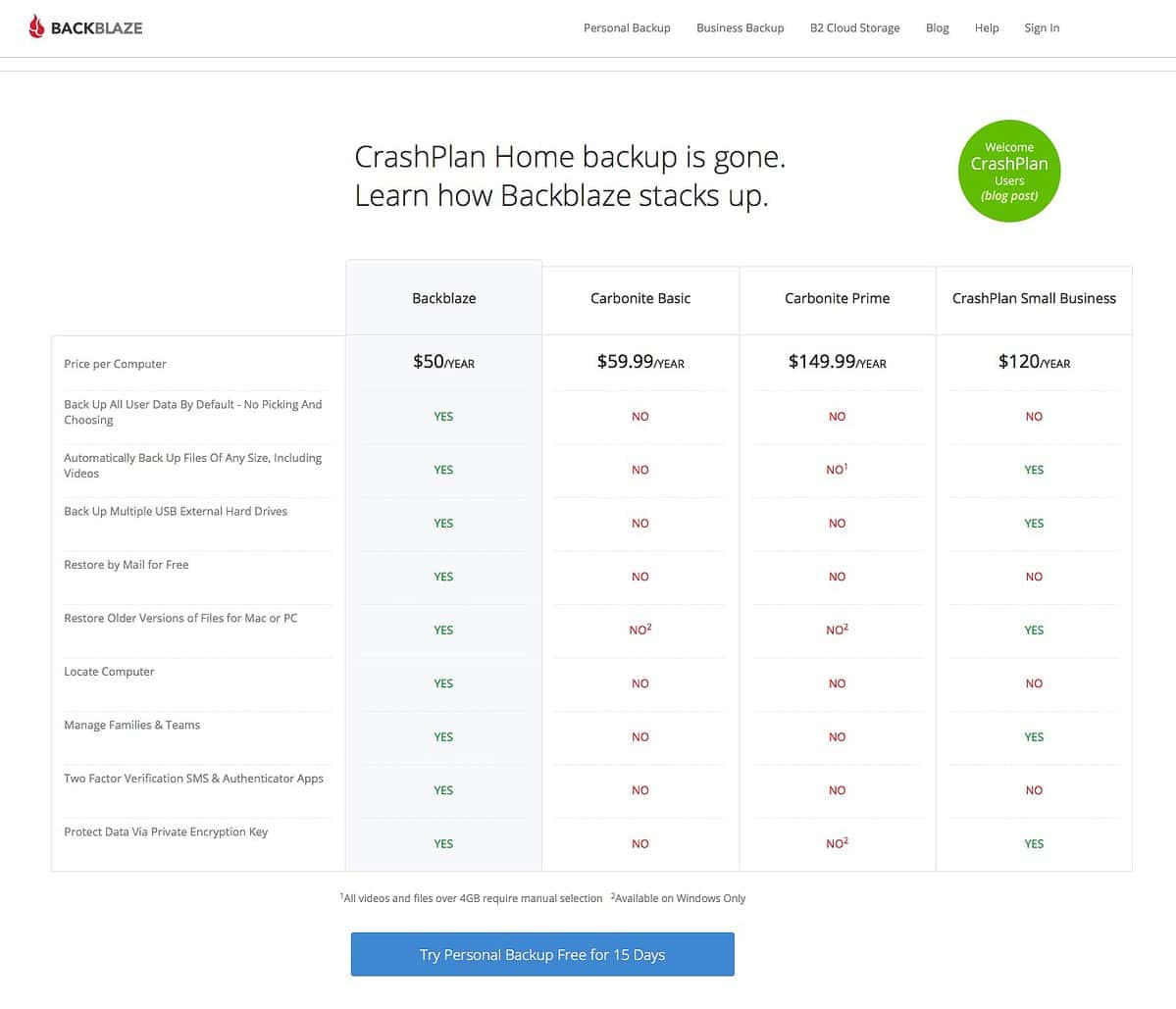Dr. Mac’s Rants & Raves
Episode #243
I’ve been saying it since time immemorial: The only sure way to protect data you care about is to have multiple redundant backups, with at least one of them in a location other than your home or office. For years CrashPlan was my go-to solution for cloud backups. In August 2015 I said, “I’ve been using CrashPlan for years and while it’s kind of ugly, it’s the best and most cost-effective backup utility I know.”
Last year CrashPlan began behaving badly. So, after uninstalling and reinstalling it countless times and hours spent searching for a solution, I gave up and switched to BackBlaze, which offers unlimited backups to its cloud for just $50/year. And, for what it’s worth, the BackBlaze software isn’t ugly.

I switched to another provider because Code42’s support was lacking, and I was tired of wasting time looking for solutions every time it broke, which was far too often.
So Long, CrashPlan for Home
Now, everyone who uses CrashPlan for Home will have to switch to something because Code42 announced last week that it’s exiting the consumer backup market. It is no longer accepting new or renewal subscriptions for CrashPlan for Home, and the product will cease to exist completely on October 23, 2018.
Code42 offers two options for existing customers:
- Migrate your data to CrashPlan for Small Business ($10/month per device) and back up for free until the end of your current CrashPlan for Home subscription; 75% off for the first 12 months of CrashPlan for Small Business, and $10 per device per month after that.
- A new subscription with Carbonite, Code42’s “exclusive partner for home users,” which offers a cloud-based backup service similar to BackBlaze, starting at $60/year, with 50% off for an unspecified length of time. Since I’m no longer a CrashPlan for Home subscriber, I was unable to see the actual offer.
So, here’s what I recommend for current CrashPlan for Home users:
First, there’s no need to panic. You have some time to think about your next step. Evaluate your options with and without the promotional discounts for CrashPlan for Small Business and Carbonite. Then, compare the prices and features with BackBlaze before you make a decision.
For what it’s worth, Backblaze has a simple chart that you might find helpful:

The Decision Would Be Easy (For Me)
That decision wouldn’t be hard for me. CrashPlan for Small Business will be more than twice the price of BackBlaze when its promotional pricing expires. And, the Carbonite Basic plan, which goes for $60/year before discounting, lacks many features that BackBlaze includes in its $50/year package.
After the promotional prices go away, I think BackBlaze delivers more bang for the buck. Furthermore, having used BackBlaze for almost two years without a single hiccup, I feel comfortable recommending to anyone needing cloud-based backups.
Bottom line: It doesn’t matter which option you choose. What is important is that you choose one and maintain a cloud-based backup of your data.
Just in case.

@jchhenderson and @Bob:
I have read both statements cited by jchhenderson about BackBlaze and Carbonite in online reviews for my personal research into both, and would need to go back and dig those assertions up. These have been from putative clients. I have not read these claims from either service.
That said, BackBlaze does say on their website that you can store multiple versions of your backups for up to 30 days https://www.backblaze.com/cloud-backup.html, which is not the same thing as that any single backup older than 30 days is deleted.
In any case, your (Bob’s) greater point that you want multiple redundancy for your backup strategy, with at least one offsite backup option in case of a local catastrophic event, still holds. All of these cloud storage options have limitations, not least of which is speed and convenience of recovery. This is likely most people’s last line of defence.
Let’s face it, if backup from an online service is the option that you are reduced to, you are clearly in a world of hurt.
BackBlaze and Carbonite are not a patch on Crashplan (Sadly).
BackBlaze deletes your attached disk if it is not reconnected regularly and BackBlaze / Carbonite only keeps 30 days worth of versioning (34 versions; hourly for last 24 hours, daily for the last 7 days and weekly for next 4 weeks).
…so you cannot recover a change (or deletion) you made 31 days ago. Accidental deletions may well be discovered too late. Also impossible to recover from an infected file that was implanted 31+ days ago.
I don’t know about BackBlaze. I’ve disconnected for as much as week at a time (for travel) without a problem. Since I paid for a year in advance, I can’t believe they would erase my stuff no matter what until at least the whole year had passed.
Do you know this for a fact? Did they send email warning you first?
As for Carbonite, I don’t use it but they sure as heck don’t make it clear they delete versions older than 30 days! Are you sure of this? Can you post the URL of a page that explains this (and/or the BackBlaze thing)? Thanks in advance.
I have to say that this is why redundant redundancy is a good thing when it comes to backups. I always think of cloud backup(s) as a last resort, something that would only come into play in the worst-case scenario—if everything in my office and bank safe deposit box (where I store my physical offsite backups) were destroyed…
If the drive is detached for more than 30 days, Backblaze interprets this as data that has been permanently deleted and securely deletes the copy from the Backblaze datacenter.
Files that are deleted or removed from the system backing up are retained in the Backblaze backup for 30 days, for the purposes of recovery. After 30 days, those files are deleted from the Backblaze backup as well.
We retain files in your personal backup for 30 days.
…that last one (point 9 in the link) appears is under the “external drive” section but, talking on forums (since Crashplan announced its exit, Backblaze representatives confirmed they only keep 34 versions (max 30 days) for all files; they consider keeping data longer to be archiving…
you can disconnect the drive for up to 30 days before BackBlaze considers it to be “gone” and deletes the backup.
I believe you can disconnect your Mac from backBlazd for up to 6 months before Backblaze deletes your entire backup.